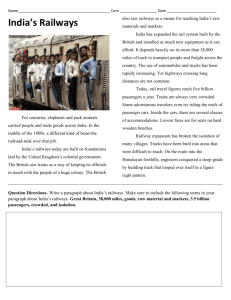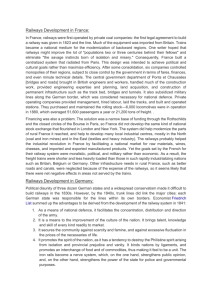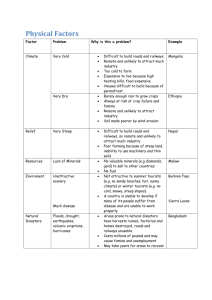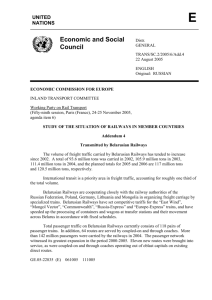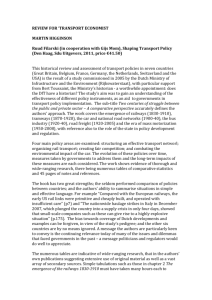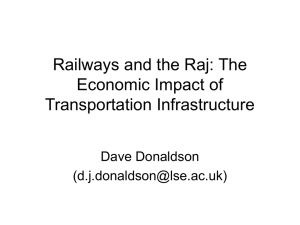Impact of railways - SchoolsHistory.org.uk
advertisement
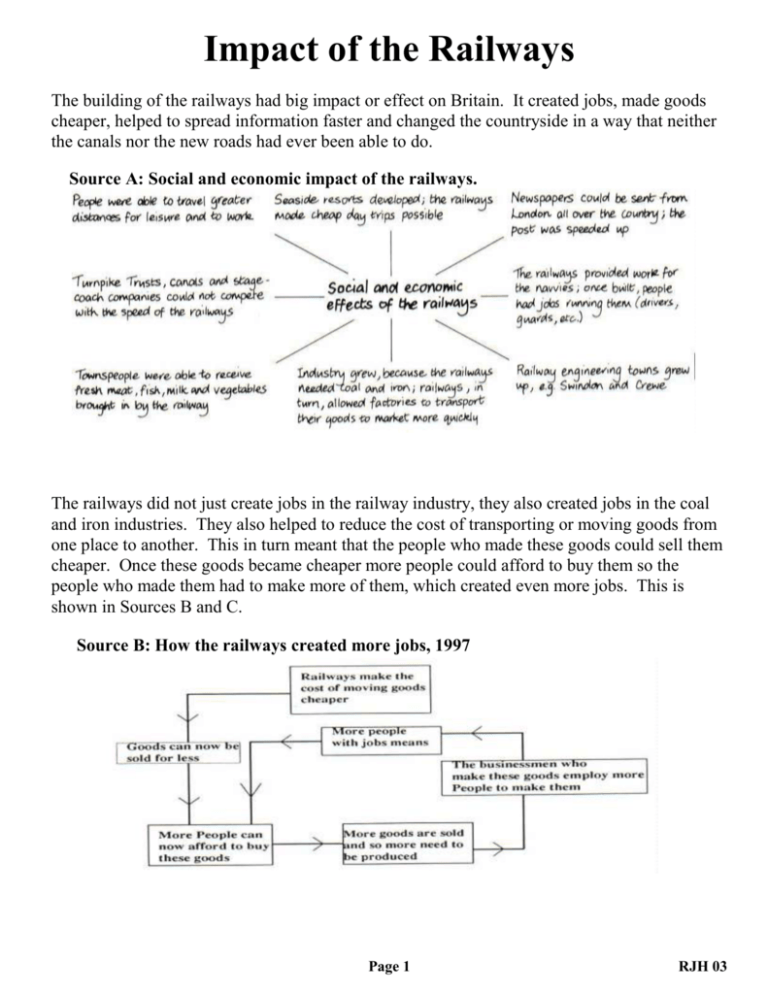
Impact of the Railways The building of the railways had big impact or effect on Britain. It created jobs, made goods cheaper, helped to spread information faster and changed the countryside in a way that neither the canals nor the new roads had ever been able to do. Source A: Social and economic impact of the railways. The railways did not just create jobs in the railway industry, they also created jobs in the coal and iron industries. They also helped to reduce the cost of transporting or moving goods from one place to another. This in turn meant that the people who made these goods could sell them cheaper. Once these goods became cheaper more people could afford to buy them so the people who made them had to make more of them, which created even more jobs. This is shown in Sources B and C. Source B: How the railways created more jobs, 1997 Page 1 RJH 03 Impact of the Railways Source C: Transport of goods by road and rail The railways did just change the way goods were transported. They changed the way people travelled about the country. Instead of travelling on mail coaches people started to travel by train, which was not only cheaper but also faster. Source D: Journey times from London, 1997 Source E: Train Ticket The new trains meant that for the first time, even poor people could travel long distances. The working class started to make day trips to Blackpool, Scarborough, Whitby, Skegness and Brighton. Some east coast villages grew into large seaside resorts because of the railway. Page 2 RJH 03 Impact of the Railways Train travel also encouraged people to read. The railways also meant that national newspapers and letters could be taken anywhere in Britain and even delivered the next day. People began to read the latest news about Parliament and the social reforms taking place. This led to more and more people becoming interested in politics and led to a growth of political parties. Source F: 1862 Railways also changed the time that people lived by! Before the railways each part of the country had its own time, which was set for when the sun reached midday in their area. The further west you travelled you had to add 1 minute for every ten miles. When the railways were built this had to change as a number of train crashes were caused by trains running to different times. Station clocks like the one in Source H began using London GMT time. In 1880, Greenwich Mean Time became everyone’s time in Britain. Source G: Station Clock Source H: RJ Huggins, 1997. The speed at which trains could travel also changed the food that people could eat. Fresh eggs, milk and fish could be carried into the new industrial towns. Fish and chips began to replace pigs’ trotters as a cheap working class supper! Differences between different areas started to break down as people from different areas came into contact with each other. For example, local accents and dialects became less noticeable as people began to mix and talk to each other. Page 3 RJH 03 Impact of the Railways Sources I, J & K show how the village of Itchen Abbas in Hampshire changed as a consequence (result) of the railways. Source I: Itchen Abbas in 1830 Source J: Map of Itchen Abbas, 1870 Source K: Itchen Abbas - Birth Places of villagers - census returns 1861 and 1881 Birth Place 1861 (Before railway) 1881 (After railway) Born in Itchen Abbas 92 68 Born elsewhere in Hampshire 92 105 Born outside Hampshire 30 71 Total Population 214 244 Page 4 RJH 03 Impact of the Railways Activities: Impact of the Railways Look at Source B 1. What effect did the railways have on the cost of transporting goods? 2. How did railways help to create more jobs? 3. Copy Source B into your book. 4. Look at Source C. Why was it cheaper to transport goods by rail rather than roads? 5. Look at Source D. What effect did the railways have on journey times from London? Give examples. 6. Look at Sources E. What effect did the railways have on what people did in their leisure time? 7. What changes did the railways bring to the time that people set their clocks and watches? 8. What effect did the railways have on the books and newspapers people read? Look at Source H 9. What changes did the railways bring to the food the working class ate? Why? 10. What effect did the railways have on the way people spoke? Why? Look at Sources I, J & K. 11. What impact (changes) did the railways have on Itchen Abbas? 12. Copy Source A into your book. Extended Writing Write an essay of about 500 words describing the changes that the railways had on Britain. Include all yours answers to the above questions in your essay. Warning: Your essay may be used to assess your National Curriculum Level! Page 5 RJH 03

